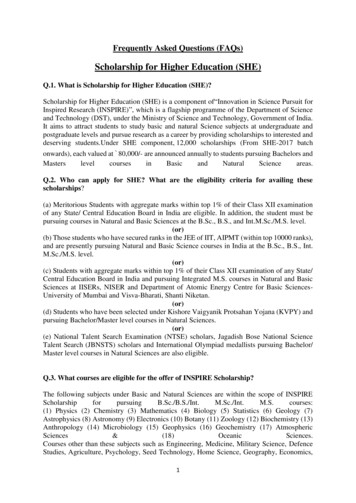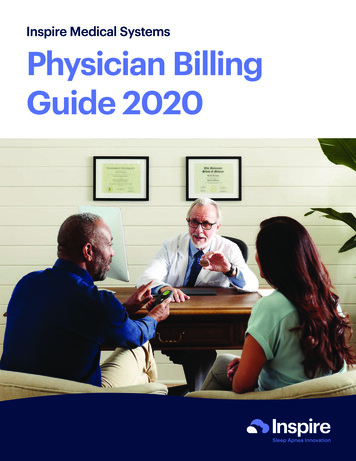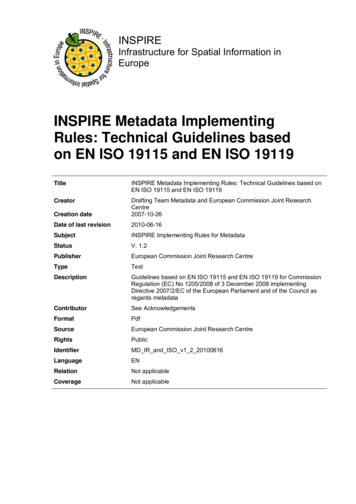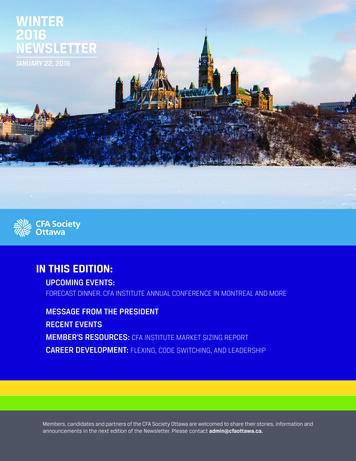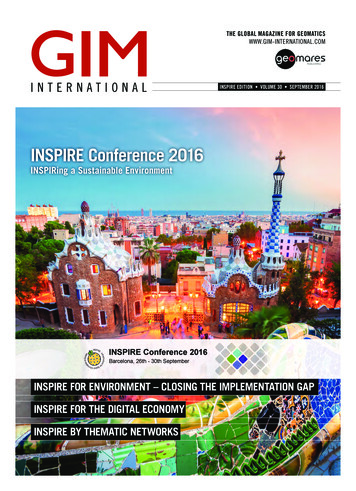
Transcription
THE GLOBAL MAGAZINE FOR PIRE EDITION VOLUME 30 SEPTEMBER 2016INSPIRE Conference 2016INSPIRing a Sustainable EnvironmentINSPIRE FOR ENVIRONMENT – CLOSING THE IMPLEMENTATION GAP .INSPIRE FOR THE DIGITAL ECONOMY.INSPIRE BY THEMATIC NETWORKS.01 cover.indd 216-09-16 09:14
GIM INTERNATIONALVIDEO CHANNELTHE FOLLOWING PRESENTATIONS FROM THE GIM INTERNATIONALSUMMIT 2016 ARE NOW AVAILABLE ON OUR WEBSITE:The Where of Everything – Ed ParsonsFURTHERMORE:Africa by Numbers: Knowledge & Governance – Morten Jerven Technical presentations by RIEGL, Trimble and what3wordsBIM: Here, There, Everywhere – James Kavanagh Interviews with and testimonials by delegates of theFuture African Cities: New Urban Fantasy Plans – Vanessa WatsonGIM International Summit 2016Cadastral Dimensions: Beyond 2D – Daniel SteudlerGoverning Geospatial Information for Good Governance – Geert BouckaertSimplification and Visualisation of Data – Pier VellingaSharing Our Earth: Water and Social Justice – Joyeeta GuptaFOLLOW GIMINTERNATIONALON YOUTUBEVISIT WWW.GIM-INTERNATIONAL.COM/GIMSUMMIT-2016 TO WATCH THE VIDEOS!GIM0716 Youtube advertentie.indd 1222-06-16 10:16
CONTENTSINSPIRE FOR ENVIRONMENT – CLOSING THE IMPLEMENTATION GAPJOACHIM D’EUGENIO – INSPIRE IMPLEMENTATION STATE OF PLAY AND OUTLOOKPAGE 7MÁRIO CAETANO, JOAQUIM PINTO DA COSTA, EMILIO LÓPEZ ROMERO, ELISA RIVERAMENDOZA – THE IBERIAN PENINSULA INSPIRE IMPLEMENTATION OUTLOOKPAGE 8ULLA KRONBORG MAZZOLI, PANU MUHLI, CHRISTINA WASSTRÖM –THE NORDIC INSPIRE IMPLEMENTATION OUTLOOKPAGE 11MARTIN LENK, MARC LEOBET – INSPIRE IMPLEMENTATION OUTLOOK ACROSS FRANCEAND GERMANYPAGE 13BENOÎT FRIBOURG-BLANC – SETTING THE SCENE: INSPIRE FOR REPORTINGAND DISSEMINATION OF URBAN WASTE WATER INFORMATIONPAGE 14INSPIRE FOR THE DIGITAL ECONOMYMARGARIDA ABECASIS – RELEVANT POLICY DEVELOPMENTS IN THE EU’SDIGITAL ECONOMY INITIATIVESPAGE 18MAURO FACCHINI – SYNERGIES BETWEEN THE EU COPERNICUS PROGRAMME AND INSPIREPAGE 20MIGUEL ÁNGEL ESBRÍ – POTENTIAL OF INSPIRE AND COPERNICUS FOR E-GOVERNMENTAND ENVIRONMENTPAGE 21STAVROS TEKES – USABILITY AND DEVELOPMENT OF E-GOVERNMENT PLATFORMS:IMPROVEMENTS BASED ON THE APPLICATION OF THE INSPIRE SERVICEPAGE 23SERGIO ANGUITA – POWERING E-GOVERNMENT SERVICES THROUGH INSPIREPAGE 25INSPIRE BY THEMATIC NETWORKSMICK CORY – INSPIRE BY MAPPING AGENCIES: THE EUROPEAN LOCATION FRAMEWORK,ELF EXPERIENCE AND OUTLOOKPAGE 26JANUSZ DYGASZEWICZ – BENEFITS AND CHALLENGES OF INSPIRE IN THE FIELD OFSTATISTICSPAGE 28LUCA DEMICHELI – TOWARDS AN INSPIRE-COMPLIANT EUROPEAN GEOLOGICAL DATA INFRASTRUCTURE: CHALLENGES AND OPPORTUNITIESPAGE 30ALESSANDRO PITITTO AND LUIGI FALCO – THE EUROPEAN MARINE OBSERVATIONS AND DATANETWORK (EMODNET) AND INSPIREPAGE 32ERIC PETERMANN AND WILLIAM MCCAIRNS – THE EUROPEAN METEOROLOGICALSERVICES AND INSPIREPAGE 33I N S P I R E S P EC I A L 2 016 03 contents.indd 3INTERNATIONAL 315-09-16 16:59
MY TOUCHSOLVING LAND PROBLEMS“I decided to study at ITC in order to obtainmore knowledge and skills to be able toshare with others. I want to be able to makeeven better use of my professional andscientific expertise. I opted for ITC becauseof its good reputation in the field of geoinformation sciences and remote sensing.I eventually want to help solve problems inthe field of land usage.”As Peter Fosudo has discovered, thefaculty of Geo-Information Science andEarth Observation (ITC) of the University ofTwente in Enschede, the Netherlands, isone of the world’s foremost education andresearch establishments in the field of geoinformation science and earth observation.We offer a wide range of the world’s bestdegree courses in the following fields: APPLIED EARTH SCIENCES GEOINFORMATICS LAND ADMINISTRATION NATURAL RESOURCES MANAGEMENT URBAN PLANNING AND MANAGEMENT WATER RESOURCES ANDENVIRONMENTAL MANAGEMENTAdd your touch. Join the world’s pioneersin geo-information science and earthobservation.PETER FOSUDO,MASTER’S STUDENT GEO-INFORMATION SCIENCE AND EARTH OBSERVATION AT ITCFOR MORE INFORMATION VISIT WWW.ITC.NLOR E-MAIL US AT INFO-ITC@UTWENTE.NL
EDITORIALPUBLISHING DIRECTOR Durk HaarsmaFINANCIAL DIRECTOR Meine van der BijlSENIOR EDITOR Dr Ir. Mathias LemmensCONTRIBUTING EDITORS Dr Ir. Christiaan Lemmen, Dr RohanBennett, Martin Kodde MSc, Huibert-Jan Lekkerkerk, FrédériqueCoumans, Ir. Sabine de MillianoEDITORIAL MANAGER Wim van WegenCOPY-EDITOR Lynn Radford, Englishproof.nlKEY ACCOUNT MANAGER Sybout WijmaACCOUNT MANAGER Rutger PostMARKETING ASSISTANT Trea FledderusCIRCULATION MANAGER Adrian HollandDESIGN ZeeDesign, Witmarsum, www.zeedesign.nlREGIONAL CORRESPONDENTSUlrich Boes (Bulgaria), Prof. Dr Alper Çabuk (Turkey), PapaOumar Dieye (Niger), Dr Olajide Kufoniyi (Nigeria), Dr DmitryKurtener (Russia), Dr Jonathan Li (Canada), Dr Carlos Lopez(Uruguay), Dr B. Babu Madhavan (Japan), Dr Wilber Ottichilo(Kenya), Dr Carl Reed (USA), Dr Aniruddha Roy (India), Prof. DrHeinz Rüther (South Africa), Dr Tania Maria Sausen (Brazil)GIM INTERNATIONALGIM International, the global magazine for geomatics, ispublished each month by Geomares Publishing. The magazineand related e-newsletter provide topical overviews andaccurately presents the latest news in geomatics, all aroundthe world. GIM International is orientated towards a professionaland managerial readership, those leading decision making,and has a worldwide circulation.PAID SUBSCRIPTIONSGIM International is available monthly on a subscription basis.The annual subscription rate for GIM Internationalis 120 with. Subscription can commence at any time, byarrangement via our website or by contacting Abonnementenland, a Dutch subscription administration company.Subscriptions are automatically renewed upon expiry, unlessAbonnementenland receives written notification of cancellation atleast 60 days before expiry date. Prices and conditions may besubject to change. For multi-year subscription rates or informationon current paid subscriptions, contact Abonnementenland, Postbus20, 1910 AA Uitgeest, Netherlands 31 (0)251-257926(09.00-17.00 hrs, UTC mation about advertising and deadlines are available inthe Media Planner. For more information please contact our keyaccount manager: sybout.wijma@geomares.nl.EDITORIAL CONTRIBUTIONSAll material submitted to Geomares Publishing and relating toGIM International will be treated as unconditionally assignedfor publication under copyright subject to the editor’sunrestricted right to edit and offer editorial comment. GeomaresPublishing assumes no responsibility for unsolicited material orfor the accuracy of information thus received. GeomaresPublishing assumes, in addition, no obligation to returnmaterial if not explicitly requested. Contributions must be sentfor the attention of the editorial manager:wim.van.wegen@geomares.nl.ROBERT KONRAD, EUROPEAN COMMISSION, DG ENVIRONMENT, HEAD OF UNIT E.4 COMPLIANCE AND BETTER REGULATIONINSPIRE – Is It Livingup to the Promise?It is with great pleasure that we welcomeclose to a thousand participants to our annualINSPIRE conference in Barcelona, organisedin conjunction with our partners and friendsfrom the Institut Cartogràfic i Geològic deCatalunya and with the support of the Spanishgovernment.INSPIRE conferences are always momentswhere all of us take stock and reflect perhapsalso on the promises we made. Did we notpromise that, through implementing INSPIRE,there would be no more obstacles to the sharingof spatial data between all levels of government?That online services would become availableto all, so that they could find and work withthe data to protect our environment throughbetter information? That we would be able toseamlessly combine spatial data from differentsources for greater efficiency?I personally am very much looking forward tolearning how far we have come together indelivering on those promises, to finding out howrealistic our promises have been and to seeinghow relevant and important what we are doingstill is for our citizens, our economy and, ofcourse, our environment. The many workshopsand oral presentations on this year’s programmewill tell us more about how INSPIRE is beingput into practice, what lessons we have learnedand where more progress can be made.The three thematic plenaries of this year’sconference take a special place in theprogramme. It is here that we will all cometogether for debates between experts from theMember States, from the Commission servicesand from thematic networks and the privatesector, who will share their implementationexperiences and future expectations.This special edition of GIM Internationalmagazine focuses on these thematic sessions.It consists of a series of interviews, providingbackground information and more details aboutparticular aspects of INSPIRE addressed bythe experts and representatives presenting inthe thematic plenaries. We invite you to take amoment to read these articles. They have beenproduced especially for you, for all participantsat the conference and also for those who couldnot join us, to reflect on the questions askedand answers given from your own perspectives.They cover issues and challenges, such ashow to address implementation gaps? How tobuild an information infrastructure which trulyconnects across all borders? How to addressthe challenges and opportunities arising fromthe EU’s digital economy initiatives? And howimportant are pan-EU partnerships in tacklingthe implementation challenges of INSPIRE?Hopefully, this special issue will also provide youwith inspiration to participate in the debates, notonly in the plenaries but also during the entireconference. And perhaps also to rememberthe last time you made yourself a promise youdidn’t keep.ROBERT KONRADWorking for the European CommissionDelegation/Representation in Bratislavabetween 1998 and 2010, Robert wasresponsible for EC communication inSlovakia. In 2010, he joined theDirectorate General for Environment,initially as Head of the CommunicationUnit. From 2013, he is in charge of theCompliance and Better Regulation Unit,dealing also with environmentalinformation, transparency and reportingpolicies.No material may be reproduced in whole orin part without written permission ofGeomares Publishing.Copyright 2016, Geomares Publishing,The NetherlandsAll rights reserved. ISSN 1566-9076?Geomares PublishingP.O. Box 112, 8530 AC Lemmer,The NetherlandsT: 31 (0) 514-56 18 54F: 31 (0) 514-56 38 al.comOCTOBER 2 0 1 6 05 editorial.indd 5INTERNATIONAL 515-09-16 16:45
Thematic Plenary I:INSPIRE for Environment –Closing the Implementation Gap27 September 201613:30 – 15:00 Auditorium IChair: Stefan JensenEuropean Environment Agency, Head of Group,Data ManagementThe first thematic plenary session, “INSPIREfor environment – closing the implementationgap”, will focus on the effectiveness ofthe implementation of the INSPIRE valueproposition in satisfying the needs of itscustomer segments in the environmentalpolicy domain.The first intervention in this session will setthe scene by presenting an approach forthe active dissemination and reporting ofinformation related to legislation on urbanwaste water and the role of INSPIRE.The second intervention by the EuropeanCommission, DG ENV, will provide an EUoverview of the implementation state-ofplay. It will present a number of issues,recommendations and the outlines of aforward looking strategy at the EU level forturning those in concrete actions.Such actions require strong coordinationbetween the EU and Member States.They will have to be tailored to the specificimplementation challenges faced by differentcountries, across their borders and acrossthe thematic communities who are partners,implementers as well as customers ofINSPIRE.To fuel the debate, representatives froma number of neighbouring countries willthen present their plans and views onimplementation.INSPIRE for Environment – closing the implementation gapINSPIRE Implementation:State of Play and OutlookIs the implementation of the INSPIREDirective progressing according toplan and what has been achieved?The Commission published anImplementation Report underpinned bya detailed evaluation. It concludes thatprogress has been made in implementation,particularly in some Member States. However,the implementation gaps in most MemberStates are significant.The findings in relation to the differentimplementation steps can be summedup as follows: All Member States have coordinationstructures in place, but their effectivenessis variable.6 T he national data policies for sharing dataare variable and heterogeneous. ManyMember States reported important datapolicy issues that hamper the sharing ofspatial data between public authorities andwith the public. Significant progress has been made asregards the spatial data sets identified.However, for many Member States, thenumbers remain low and with limitedthematic coverage compared to some ofthe better performing countries. Implementation of the documentationobligations is at an advanced stage, yetvariable quality remains and is a matter ofconcern. M ember States made progress on theonline discovery services. The availabilityof digital services for viewing anddownloading spatial data for further usewas less advanced. The interoperability of the spatial data setshas not advanced much, mainly becausethe main implementation deadlines are stillin the future.Having said all this, there are many goodexamples and outstanding projects that havebeen carried out within or between MemberStates. We are looking forward to seeingand hearing many more during the INSPIREConference 2016.international i n s p i r e s p ec i a l 2 01606-07 Eugenio.indd 615-09-16 16:32
By Joachim D’Eugenio, European Commission – DG Environment - Compliance and Better Regulation Unit Thematic Plenary 1Nowadays, what are the main challengesfor the implementation of theDirective?At this half-way point in the implementationprocess, the main challenges have beenidentified as part of our fitness-for-purposeevaluation and can be summarised as follows: The effectiveness and efficiency ofthe implementation vary. The level ofeffectiveness can often be related toimplementation efforts (and investment)by Member States. Most have not doneenough in this respect, and can closetheir implementation gaps through,for example, more investment in skillsand infrastructure, better coordination,improving the free flow of data by updatingtheir data policies, better streamlining withnational policies on eGovernment andopen data. Efficiency cannot, at this stage, bedemonstrated through a positive costbenefit balance in quantitative terms.However, overall implementation costsappear lower than predicted and mostMember States reported qualitativebenefits, such as improved access to aninformation and evidence base. There are indications that someimplementation efforts which are not dueuntil 2020 may be costly and difficult toachieve, in particular in relation to dataharmonisation. Moreover, the INSPIREreporting requirements appear to havepotential for streamlining. Harvesting EU added value is not fullyrealised given the different levels ofimplementation. This can be overcome bya better alignment of the Member Statesimplementation plans and demonstratedthrough cross-border and end-userapplications at EU level.processes at national level. To complementnational efforts, the Commission will carryout a number of actions. In particular, itwill evaluate the national data policies,review, and possibly revise, the INSPIRErules, especially those on spatial dataharmonisation, to take into account theimplementing risks and complexities witha view to reducing them. The Commissionwill step up the assistance to the MemberStates in applying and implementingthe INSPIRE Directive, e.g. by the useof common tools. Other actions in thecontext of the Digital Single Market willalso contribute to implementing INSPIRE(e.g. the Interoperability Solutions forPublic Administrations programme, theeGovernment Action Plan and the EuropeanInteroperability Framework) as will the furtherinclusion of INSPIRE services and dataharmonisation in relevant EU initiatives (e.g.Copernicus, Horizon 2020). We are lookingforward to discussing these proposed actionsat the INSPIRE Conference 2016.What future actions are beingconsidered for closing theimplementation gap?Why is there a need to focus on theenvironment?Based on the evaluation results, it is clear thatgreater effort at all levels by all actors is neededin the future. To this end, the Commissionproposed in its Report a number of actions forboth Member States and at EU level.Member States need to step up their effortsin implementation and critically reviewthe effectiveness of their data policies. Inaddition, they were recommended to givemore priority to environmental spatial datasets and to improve coordination betweenthe national INSPIRE implementation andeGovernment, open data and other relevantThe INSPIRE Directive is based on theenvironment article on the Treaty and wasdesigned to support first and foremostenvironment policy. This is clearly reflectedin Article 1 of the Directive: “The purposeof this Directive is [ ] the establishmentof the Infrastructure for Spatial Informationin the European Community (hereinafterreferred to as Inspire), for the purposesof Community environmental policies andpolicies or activities which may have animpact on the environment.” Our evaluationshowed that this has been sometimesforgotten in the implementation and that theenvironment sector is not (yet) exploiting thebenefits of this spatial data infrastructureas much as it could do. This requirescloser engagement with the environmentuser communities. Hence, we chose thisyear’s INSPIRE Conference to focus onthe theme of “INSPIRing a sustainableenvironment”. Having said this, we stillrealise the importance and encourage theuse of INSPIRE in other policy domainssuch as transport, energy, health, landplanning and meteorology, not least becauseall these domains are closely connectedto environment policy. The strength of theINSPIRE Directive is integration, in otherwords bringing together different data andinformation pools and thereby creatingaccess to all relevant “big environmentaldata”. Hence, focusing on the environmentalso means working more closely togetherwith all these other sectors.Joachim d’EugenioAs environmental engineer by training, JoachimD’Eugenio started working in the German FederalEnvironment Agency (UBA) in Berlin. In 1999, he movedto the European Commission where he was involved inthe negotiations and the implementation of the WaterFramework Directive until 2007. After a few years in theCommission’s Secretariat General, he became DeputyHead of Unit in 2011 working on marine and waterindustry policy. Since 2015, he joined the Unit onCompliance & Better Regulation of DG Environmentwhere he is leading the Fitness Check on EnvironmentalReporting and is involved in the INSPIRE implementation.i n s p i r e s p ec i a l 2 016 06-07 Eugenio.indd 7international 715-09-16 16:32
INSPIRE for Environment – Closing the Implementation GapThe Iberian Peninsula INSPIREImplementation OutlookIs the implementation of the INSPIREDirective on the Iberian Peninsulaprogressing according to plan andwhat has been achieved?In order to achieve the implementation ofINSPIRE Directive for the purposes of theEuropean environmental policies according tothe objectives lay down in the directive, bothPortugal and Spain have set up their owncoordination structure and planning.In Spain, the service and data policieshave evolved towards more open and freeand, currently, almost all services and8 data available in the Spanish spatial datainfrastructure (SDI) can be used without strictlimitations. These open policies have broughtseveral benefits: further diffusion of thegeographic information (GI) to citizens andother sectors (public and private), improvingof the quality of data and services due in linewith users’ demands, and better knowledgeabout the technology applied to the GI.Finally, it is important to note that – for somedatasets such as orthoimagery, land coverand land use, digital terrain models and,more recently, in hydrography and transportnetworks – we have developed a nationalplan in order to produce and fund the captureand extraction of the GI among the differentagents involved, in a collaborative way.In Portugal, the implementation of INSPIREis delayed. We already have metadata for allthe spatial datasets and services we report,but we are significantly delayed in termsof the availability of data through view anddownload services. In fact, only around 10%of datasets are currently available throughsuch services. Portugal recently presentedan Action Plan to the European Commissioninternational i n s p i r e s p ec i a l 2 01608-09-10 riveramendoza.indd 815-09-16 16:31
By Mário Caetano, Joaquim Pinto da Costa, Emilio López Romero, Elisa Rivera Mendoza Thematic Plenary 1in which we commit to significantlyincreasing the number of spatial datasetsavailable through view and downloadservices by the end of 2016. Even thoughsome spatial datasets are already free andopen in Portugal, many others are not. Westill lack effective data-sharing policies withinpublic administration. The developmentof the national SDI (SNIG) will be guidedby SNIG2020, a vision of the national SDIby 2020 that was built by a collaborativeprocess in Portugal and that was approved inDecember 2015 by the Council for StrategicDevelopment of SNIG.INSPIRE has had both direct and indirectbenefits. In terms of direct benefits, INSPIREhas harmonised environmental data collectionand reporting, and indirectly enhanced transboundary data interchange. For example, theadoption of a common geographic datumfacilitated geographic data exchange betweenPortugal and Spain. This was especiallybeneficial for several directives, e.g. WaterFramework Directive, Air Quality Directive,Nature Directive and Seveso Directive.In Portugal and Spain, we strongly believethat the accomplishment of Annex I andII is of the utmost importance in orderto close the implementation gap for theEnvironmental Directives of Annex III. Withoutthe information from the INSPIRE SpatialData Set and Spatial Data Services of theseannexes, the environmental information couldnot be correctly georeferenced.Nowadays, what are the main challengesin the implementation of the IN-SPIREDirective in Portugal and Spain?The main challenges in INSPIREimplementation in Portugal and Spainare related to the implementation ofdata interoperability. The complexity ofimplementing rules on data harmonisationis also a problem. The most critical issue isto create harmonised data, and challengesinclude lack of financial and humanresources and a reduced technical capability.In addition, it is sometimes difficult to identifythe key actors for each INSPIRE themeand dataset, to obtain the data required forfulfilling INSPIRE requirements, not only atdataset level but also at attribute level, toknow the services and data-quality needsand to implement useful applications basedon INSPIRE services. Data-sharing policiesaccording to INSPIRE guidelines are wellimplemented in Spain but this is not the casefor Portugal. Some obstacles are relatedto the fact that the revenues of informationdisclosure are needed for some publicadministration entities. A further involvementof public administration at high level forINSPIRE implementation in Portugal is alsoneeded.As a further challenge, it is important toensure a coordinated adaptation to INSPIREof the spatial datasets needed in theenvironmental directives, compliant with thecommon data models defined in INSPIRE.Both countries agree that the adoption of thetechnical requirements needed to ensure theinteroperability of the data must be led by theCoordination Team (DG ENV, EEA and JRC)together with the Member States. The legalprovisions on reporting of each directive mustinclude the INSPIRE requirements.Emilio López Romero.What future actions are youconsidering, in particular for closingthe implementation gap forenvironmental policies?To close the identified gaps in implementationand steer future implementation actionstowards maximising environmental benefitsfrom the INSPIRE Directive we would needto consider several actions. Firstly, wewould need to continue to ensure the goodcoordination between the mapping agenciesand the environmental authorities. In thissense, we can profit from the work carriedout by the existing European networks in bothcommunities i.e. Eurogeographics and Eionet.Joaquim Pinto da Costa.Secondly, we would need to set up alist of priority datasets required for theimplementation of EU environmental law, inparticular the most relevant that can benefitcross-border cooperation and informationexchange and simplify the monitoring andreporting exercise.Thirdly, INSPIRE should be used as a toolto improve data sharing across borders andorganisations. As an example of successfulcooperation on air quality data reporting,Portugal and Spain developed a commonmethodology for modelling PM10 originatingfrom dust intrusions. This methodology wasadopted later on as the European standardto calculate this pollutant. Furthermore,Portugal and Spain have enrolled in an EUe-Reporting project for sharing air qualityinformation to modernise data reporting ofair quality directives, facilitate data sharing(in compliance with INSPIRE) and reducethe administrative burden of reporting.For transboundary protected sites (suchas Natura 2000) the INSPIRE DirectiveMário Caetano.would mean to adopt a common datamodel that would increase the accessibility,interoperability, quality and communicationof biodiversity-related data at EU level(through the GEO catalogues, GEOportal,GEO services). Some examples of currentcooperation on nature sites are the DouroInternational Nature Park and the Tejo/Tajo International Transboundary BiosphereReserve. In terms of biodiversity andspecies distribution, the development andadoption of standards adapted to INSPIREsuch as the Plinian Core standard regardingi n s p i r e s p ec i a l 2 016 08-09-10 riveramendoza.indd 9international 915-09-16 16:31
Biodiversity and Species distribution couldbe of high interest for the joint processingof cross-border datasets from differentcountries regarding biodiversity and speciesdistribution. In terms of water, Spain andPortugal share five main river basins, three ofwhich (Duero/Douro, Tajo/Tejo and Guadiana)are also among the largest basins on theIberian Peninsula. The Albufeira Convention(1998) regulates the transboundary watersin the shared basins between Spain andPortugal. The Convention aims at fosteringbilateral information exchange, informationto the public, assessment and dialogue ontransboundary impacts, pollution controland prevention, water uses, droughts andresource scarcity, assignment of rights,dispute resolution, etc. All these tasks wouldbenefit from INSPIRE implementation. In thissense, the last conference of the parties ofthe Convention aimed at ensuring networkconnectivity through the Hydro Node used toconnect different networks.Fourthly, we would need to communicate thebenefits of INSPIRE in terms of enhancingthe efficiency of environmental dataElisa Rivera Mendoza.reporting. In order to avoid administrativeburdens and several data flows related tothe same data being available several times,the monitoring and reporting regime underthe INSPIRE Directive needs streamliningwith the reporting under environmentalMário CaetanoMário Caetano is a principal investigator of Directorate-General of Territorial Development (DGT) and sinceOctober 2014 he is the deputy director-general of DGT with responsibilities on geographic information,remote sensing and the national spatial data infrastructure (SNIG). In 2015, Mário Caetano launchedSNIG2020: a collaborative vision for the Portuguese spatial infrastructure. He is also an associate professorat Information Management School from the New University of Lisboa (NOVA IMS). He is the author of morethan 150 publications in books, journals and conference proceedingsJoaquim Pinto da CostaJoaquim Pinto da Costa is head of the Department of Technology and Information Systems of the PortugueseEnvironment Agency (APA). Graduated as Msc Science in Environmental Engineering in 1989, Joaquim Pintoda Costa did a post-graduation scholarship in “Sciences and Sea Technology”, participated in severalOceanographic campaigns and the analysis of the gathered data. For the last 25 years he’s been working inthe GIS field, teaching and applying it to environmental monitoring and hydrological modelling. Participated,published and presented technical articles in national and European meetings regarding the application ofGIS in INSPIRE, Water Framework and Floods Directives.Emilio López RomeroEmilio López Romero is a computer engineer. He is the director of the National Centre for GeographicInformation of Spain and member of the INSPIRE Committee and the Maintenance and ImplementationGroup. For more than 12 years he has been working in the field of SDI with main focus on governance and ITarchitecture both in a national and international context.Elisa Rivera MendozaElisa Rivera Mendoza is the Spanish National Focal Point of the European Environmental Agency, coordinatorof the Spanish Copernicus Users Forum and alternate in the Political Implementation Group of INSPIRE.Before becoming civil servant in the Spanish Administration she worked in the Council of Europe where shestarted her international career. She works as advisor in European and International affairs for more than 15years now and teaches courses on European environmental policy.10 legislation. The reporting exercise should besimple, electronic and interoperable – in linewith the SEIS principles: ‘One dataset forseveral uses’. Achieving this objective
INSPIRE EDITION VOLUME 30 SEPTEMBER 2016 INSPIRE Conference 2016 INSPIRing a Sustainable Environment INSPIRE FOR ENVIRONMENT - CLOSING THE IMPLEMENTATION GAP. INSPIRE FOR THE DIGITAL ECONOMY. INSPIRE BY THEMATIC NETWORKS. 01_cover.indd 2 16-09-16 09:14

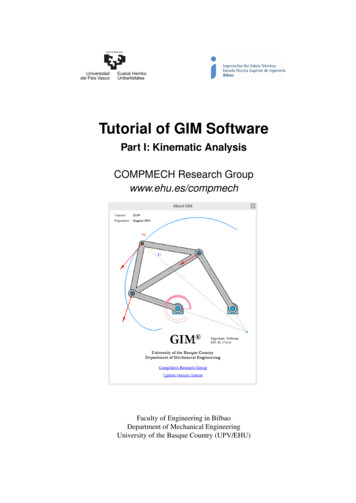


![Moran Conference Presentations June 2016 [website version]](/img/55/moran-conference-presentations-june-2016-website-version.jpg)
